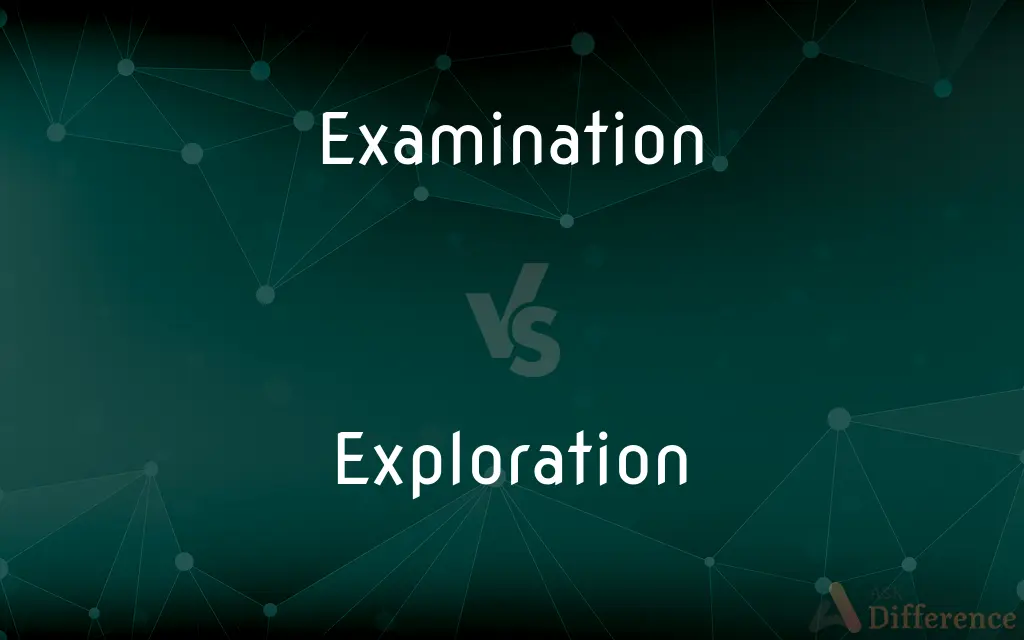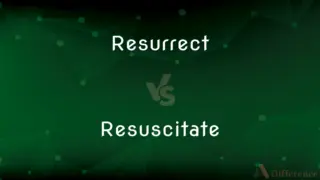Examination vs. Exploration — What's the Difference?
By Tayyaba Rehman & Maham Liaqat — Updated on April 18, 2024
Examination involves detailed analysis to assess understanding or condition, while exploration is about discovering unknown aspects or information.

Difference Between Examination and Exploration
Table of Contents
ADVERTISEMENT
Key Differences
Examination typically refers to a process of testing knowledge, health, or quality to evaluate condition or performance, whereas exploration involves investigating or traveling through an area to discover something new.
In education, examination is used to measure students' understanding and proficiency in various subjects through tests and quizzes, on the other hand, exploration in this context might involve hands-on learning and research projects that encourage curiosity and discovery.
Examination can be highly structured, often following specific guidelines or criteria to ensure consistency and reliability, while exploration is generally more open-ended, allowing for creativity and unpredicted outcomes.
In the medical field, examination is crucial for diagnosing diseases and monitoring the health status of patients through systematic methods, whereas exploration in medicine could involve experimental approaches or researching new treatments.
Examination often results in quantifiable outcomes or grades that can influence future opportunities, whereas the benefits of exploration are usually qualitative, such as gaining new insights or expanding one’s perspective.
ADVERTISEMENT
Comparison Chart
Definition
The act of inspecting or analyzing something to determine its condition or to find important elements.
The act of traveling through or researching an area to discover or learn something new.
Purpose
To assess, measure, or validate specific criteria or conditions.
To discover unknown areas or gather information without specific assessments.
Outcome
Typically results in quantifiable data or conclusions.
Results are more often qualitative insights or new ideas.
Structure
Highly structured with clear objectives and procedures.
Generally lacks a predefined structure, allowing for flexibility.
Fields of Use
Common in academics, medicine, and quality control.
Widely used in research, travel, and creative industries.
Compare with Definitions
Examination
A detailed inspection or study.
The examination of the aircraft revealed a critical mechanical failure.
Exploration
The action of traveling in or through an unfamiliar area in order to learn about it.
The exploration of the Amazon rainforest uncovered new species.
Examination
In law, the formal questioning of a witness in court.
During the examination, the witness seemed nervous.
Exploration
Inquiry into or discussion of an issue or topic.
The book offers an in-depth exploration of ancient Greek philosophy.
Examination
A formal test of a person's knowledge or proficiency in a subject.
She passed her final examination with flying colors.
Exploration
Searching for resources like minerals, oil, or historical artifacts.
Offshore exploration for oil has its environmental risks.
Examination
A methodical look at the parts of something to understand its nature.
The doctor conducted a thorough examination of the patient.
Exploration
A systematic search or investigation.
His exploration into 18th-century literature provided valuable insights.
Examination
In finance, the auditing of accounts to verify their accuracy.
The annual examination of the company’s books is underway.
Exploration
Use in a metaphorical sense to describe mental or philosophical probing.
Her latest film is an exploration of identity and memory.
Examination
The act of examining or the state of being examined
The examination of the evidence.
Exploration
Exploration is the act of searching for the purpose of discovery of information or resources. Exploration occurs in all non-sessile animal species, including humans.
Examination
A set of questions or exercises testing knowledge or skill.
Exploration
The act or an instance of exploring
Arctic exploration.
Exploration of new theories.
Examination
A formal interrogation
Examination of the witness.
Exploration
The process of exploring.
Examination
The act of examining.
Exploration
The process of penetrating, or ranging over for purposes of (especially geographical) discovery.
The exploration of unknown areas was often the precursor to colonization.
Examination
Particularly, an inspection by a medical professional to establish the extent and nature of any sickness or injury.
Exploration
The (pre-)mining process of finding and determining commercially viable ore deposits (after prospecting), also called mineral exploration.
Examination
(education) A formal test involving answering written or oral questions under a time constraint and usually without access to textbooks; typically, a large, written test administered to high school and college students covering course material studied in a semester.
Exploration
(medicine) A physical examination of a patient.
Examination
Interrogation, particularly by a lawyer in court or during discovery.
Exploration
The act of exploring, penetrating, or ranging over for purposes of discovery, especially of geographical discovery; examination; as, the exploration of unknown countries
"An exploration of doctrine."
Examination
The act of examining, or state of being examined; a careful search, investigation, or inquiry; scrutiny by study or experiment.
Exploration
To travel for the purpose of discovery
Examination
A process prescribed or assigned for testing qualification; as, the examination of a student, or of a candidate for admission to the bar or the ministry.
He neglected the studies, . . . stood low at the examinations.
Exploration
A careful systematic search
Examination
The act of examining something closely (as for mistakes)
Exploration
A systematic consideration;
He called for a careful exploration of the consequences
Examination
A set of questions or exercises evaluating skill or knowledge;
When the test was stolen the professor had to make a new set of questions
Examination
Formal systematic questioning
Examination
Examination of conscience (as done daily by Jesuits)
Examination
The act of giving students or candidates a test (as by questions) to determine what they know or have learned
Common Curiosities
How do examinations differ from explorations in education?
Examinations test students' learned knowledge, while explorations encourage discovery and inquiry-based learning.
What is the importance of exploration in scientific research?
It allows scientists to uncover new knowledge, challenge existing theories, and propose new hypotheses.
Can an examination include elements of exploration?
Yes, especially in fields like research where the examination might require exploratory methods to gather data.
What typically characterizes an exploration?
A process aimed at discovering new information or places without specific expectations or outcomes.
Which is more structured, an examination or an exploration?
An examination is more structured, having specific guidelines and expected outcomes.
What role does exploration play in creative fields?
It is crucial for innovation and the creation of original content, as it fosters creativity and experimentation.
What is the primary purpose of an examination?
To evaluate or assess the state or knowledge of someone or something through structured testing.
In what ways can exploration influence education?
It can enhance learning by fostering curiosity, critical thinking, and a deeper understanding of subjects.
How are the outcomes of examinations and explorations different?
Examinations usually produce measurable, quantifiable results, whereas explorations result in new insights and theories.
Are explorations always successful in achieving their goals?
Not necessarily, as the nature of exploration is uncertain and can lead to unexpected or inconclusive outcomes.
How is exploration used in technology and industry?
Companies use exploration techniques to innovate and develop new technologies or to find better solutions to existing problems.
What are the risks associated with exploration?
Exploration can be risky, especially in unfamiliar or hazardous environments, and can also lead to unforeseen consequences.
How do professionals prepare for explorations in dangerous or unknown territories?
Through detailed planning, risk assessments, and training to handle potential challenges.
What can be done to make educational examinations more explorative?
Incorporating case studies, problem-solving tasks, and open-ended questions can make exams more investigative and less rote.
Why is examination important in professional settings?
It ensures that standards, quality, and proficiency are maintained, particularly in fields like healthcare, engineering, and education.
Share Your Discovery

Previous Comparison
Resurrect vs. Resuscitate
Next Comparison
Pasta vs. BurgerAuthor Spotlight
Written by
Tayyaba RehmanTayyaba Rehman is a distinguished writer, currently serving as a primary contributor to askdifference.com. As a researcher in semantics and etymology, Tayyaba's passion for the complexity of languages and their distinctions has found a perfect home on the platform. Tayyaba delves into the intricacies of language, distinguishing between commonly confused words and phrases, thereby providing clarity for readers worldwide.
Co-written by
Maham Liaqat














































